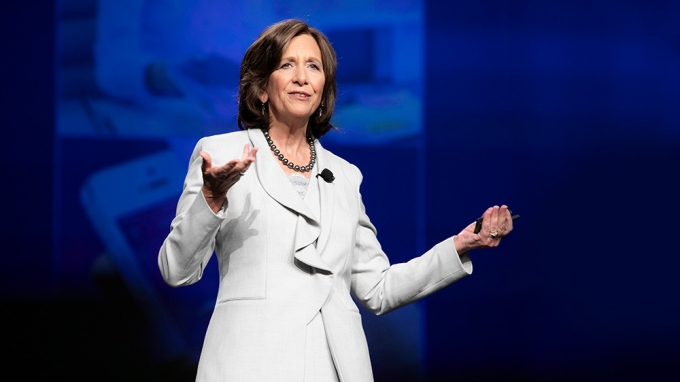As the co-founder and president of QAD, Inc., Pamela Lopker has proven herself a brilliant programmer and a formidable entrepreneur. She is also highly practical. As a math major at UCSB, she took computer science courses (before there was a computer science department) with professional life in mind. After graduating, she spent two years at Comtek Research writing software for Raytheon before teaming up with her then-boyfriend and eventual husband, the late Karl Lopker, who had founded Decker’s Outdoor — to start QAD, which provides sector-leading integrated business-manufacturing software to companies worldwide. In 2005, the Lopkers were named Distinguished Alumni of UCSB in recognition of their generous giving through the Lopker Family Foundation. Together, they supported an endowed faculty chair and multiple student fellowships in the College of Engineering, and offered programmatic and scholarship support for the Art Department. Convergence visited with Pamela Lopker.
C: What led you to computer software and coding?
PL: In my junior year at UCSB, I went to the placement center, where I took some aptitude tests and was told I could be an actuary. And I was thinking, Do I really want to be an actuary? So I started looking around. I had never taken a computer science class but thought I might be good at it. And I could see that it was a growing market, particularly on the West Coast, so it seemed a good fit for my capabilities. I was trying to get a career that would allow me to support myself and have a nice lifestyle.
C: You gave up defense work in the seventies after not being permitted aboard a Navy ship because you were a woman, a fact that, you realized, would diminish your role and impact in your field. What are your thoughts as a female entrepreneur and business leader in the male-dominated tech sector?
PL: I love to see women in the new-hire classes in technical positions. In our last round, I think we had something like ten new hires, and four were women, who typically make up only about twenty percent of the work force in computer science. It is still considered a male career, and I don’t really understand that, because it’s a great profession for women. Software developers make a good living. You can often work as an independent contractor and work from home. You don’t have to work full-time if you want to have a family. It’s a very flexible career, which is why I encourage young women to go into the tech industry.
C: You’ve mentioned being asked by students what they should study to make the most money in the least time. Do you see alternatives to that perspective?
PL: It seems that the current generation is maybe not as materialistic as our generation was. I see both of my kids wanting to do something to change the world. They really do want to have a small footprint. They don’t want to drive cars. They don’t want to leave a lot of trash in their wake. And they’re very, very conscious about that. I believe that there is new thinking about wanting to tread lightly on the Earth and to improve things and give back. But there are so many different personalities. You can say that about one group of people, and then there’s another group that has a whole different idea.
C: You have said that to be a successful entrepreneur, your passion for something has to be internalized? Can you explain?
PL: Maybe it works for certain people, but in my mind, you can’t just be sitting there thinking, How can I do the least and make the most money? You really need to want to do good for your customer. You have to want to create a product that your customer will be really happy with. And you have to personally want to do that, because if you don’t, you might make a sale, but you’re not going to have a customer. You want a customer for the long term, and you want that customer to believe that you will always have their interest in mind and that you actually want to and do deliver superior products. And if you’re not completely involved in and passionate about that, I just don’t think it’s going to work.
C: You are a strong supporter of the UCBS College of Engineering. Why do you contribute?
PL: We give back because that’s what we came from; it’s where we’ve succeeded. And the college offers tremendous access for the community. If you look at all the companies in Santa Barbara and Goleta that have been started by UCSB graduates, it’s huge. Universities like Stanford and UC Berkeley are surrounded by companies started by their alumni. I think there is the same entrepreneurial environment around UCSB, and those companies add a lot to the economy.
C: How does the QAD landscape look going forward? What’s next?
PL: Everything now is cloud computing. You no longer sell software for somebody to install on the premises. And then the next big challenge is incorporating artificial intelligence into the software and doing it well. If we missed the AI movement, we could have problems. Fortunately, we already have many “techy” people with that capability, but it’s certainly something we look at as we’re hiring new people.
The other big area is agility, so that the software we create can change when a customer needs it to, and the customer can make the change. It’s about building tools that allow them the agility to mold and change their businesses and have the software support without always having to come back to us because they need a new field on their screen or they need to calculate their pricing a little differently.

